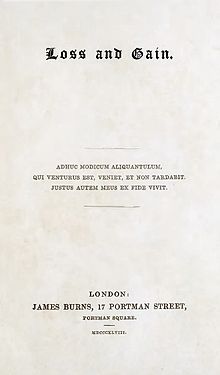Loss and Gain

First edition title page
|
|
| Author | John Henry Newman |
|---|---|
| Country | England |
| Language | English |
| Genre | Philosophical novel, Campus novel |
| Publisher | Burns & Oates |
|
Publication date
|
1848 |
Loss and Gain is a philosophical novel by John Henry Newman published in 1848. It depicts the culture of Oxford University in the mid-Victorian era and the conversion of a young student to Roman Catholicism. The novel went through nine editions during Newman's lifetime, and thirteen printings. It was the first work Newman published after his conversion to Roman Catholicism in 1845.
Loss and Gain describes the religious climate of Oxford University during the 1840s, a time of great contention between various factions within the Church of England. Some factions advocated Protestant doctrines, renouncing the development of doctrine through tradition and instead emphasising private interpretation of scripture. Against these and other liberal religious factions, the Oxford Movement, of which Newman was a leading member, advocated a Catholic interpretation of the Church of England, claiming that the Church and its traditions were authoritative. Amongst all of these thinkers, however, the Roman Catholic Church was despised as having abdicated its claim to doctrinal authority by introducing superstition into its practice. Accordingly, when Newman converted to Roman Catholicism in 1845, he met with vehement criticism. In Loss and Gain, Newman's first publication after his conversion, he expressed the intellectual and emotional development that led him to Roman Catholicism and the response his conversion elicited. Newman was in his 40s and was an esteemed theologian at the time of his conversion, but in the novel he displaces his experience onto Charles Reding, a young student entering Oxford and experiencing its intellectual climate for the first time. Although Charles attempts to follow a conventional path and avoid being influenced by "parties" (i.e. cliques advocating trendy sectarian views), he soon discovers that he is inclined towards Roman Catholicism. He struggles against this inclination but eventually decides he must convert, a decision that causes great consternation to his family and friends but leads to personal fulfilment.
...
Wikipedia
